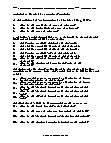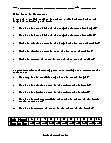Error In Measurement Worksheets
What is the Difference Between Absolute, Relative, and Percent Error? Among many types of errors, there are three major categories of errors named as absolute, relative, and percent error. By definition, the meaning of absolute is something that can never be avoided and is fixed and inevitable. The meaning of relative is something whose results depend upon the situations; for example, for a person sitting in a train, the outside world will seem to be moving, whereas in reality, that person is moving, and the outside world is still. And for himself, he will be at rest, while for a person who is standing at the station, that person on the train will be moving. So relativity is a concept based on situations. By percent we literally mean a fraction of something. So absolute error is an error that will occur in a fixed state no matter what, and it can never be avoided, such as natural error due to natural circumstances. The relative error arises due to different situations, and fractional errors are minor errors due to minor human faults.
-
Basic Lesson
Introduces the concept of range of tolerance for error. Absolute error range provides an acceptable value for error. A measurement of a field is taken to be 250 m in length and 600 m in width. The absolute error is + or - 0.05 m.
View worksheet -
Intermediate Lesson
This lesson demonstrates how to determine the absolute error of a measurement. What is the range of tolerance for length of the field? The range of tolerance will be 250 m + 0.05m = 250.05 m (top limit) and 250 m - 0.05 m = 249.95 m (lower limit)
View worksheet -
Independent Practice 1
Students practice with 20 error in measurement problems. The answers can be found below.
View worksheet -
Independent Practice 2
Another 20 error in measurement problems. The answers can be found below.
View worksheet -
Homework Worksheet
Reviews all skills in the unit. A great take home sheet. Also provides a practice problem.
View worksheet
The Outcomes...
"There are two possible outcomes: if the result confirms the hypothesis, then you've made a measurement. If the result is contrary to the hypothesis, then you've made a discovery. Enrico Fermi, Italian physicist & Nobel Prize winner







